Crossref Citations
This article has been cited by the following publications. This list is generated based on data provided by Crossref.
Mitra, Ankushi
McNew-Birren, Jill
and
Nickels, Ashley E.
2024.
Who counts in civically engaged research? Rethinking expertise and authority in politics.
Politics, Groups, and Identities,
p.
1.
Leininger, Julia
and
Schiller, Armin von
2024.
What works in democracy support? How to fill evidence and usability gaps through evaluation.
Evaluation,
Vol. 30,
Issue. 1,
p.
7.



